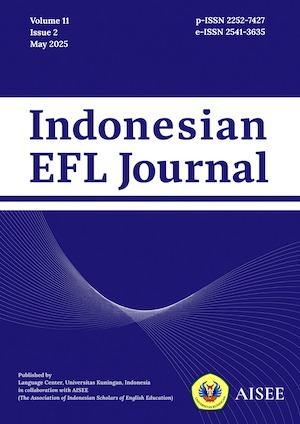THE EFFECT OF MS PHOTO STORY 3 ON STUDENTS’ SPEAKING ACHIEVEMENT
Abstract
Technology information and communication now takes the best attention from educators. It plays to be good or even better media in teaching and leraning process. Therefore, prospective English teachers should have good skill in creating new class atmosphere toward technology. They need to use technology to be the suitable media in learning English, especially speaking, since speaking is considered to be one of difficult skill. Ms Photo Story 3 is one of many computer applications that can be used as a media in teaching speaking. This present study focuses on the effect of Ms Photo Story 3 in improving prospective English teachers’ speaking and the response of using Ms Photo Story 3 in learning English, especially speaking. Experiment with one group, pre-test, treatment and post-test were employed in this study. The results showed that there are increasing prospective English teachers’ scores. It can be seen from the comparison score of pretest and posttest. Furthemore, the result from the questionaire revealed that the participants’ response after using Ms Photo Story 3 in speaking class is categorized good. Thus, it can be concluded that Ms Photo Story 3 is effective in giving prospective English teachers experiences to create digital speaking.
Keywords: Ms Photo Story 3; prospective English teachers; speaking; teaching media; technology.
References
Brown, H. D. (2010). Language assessment: Principles and classroom practices. New York: Pearson Education.
Charisma, D., & Khomarudin. (2018). Speaking through Ms Photo Story as digital storytelling. Proceedings of the 1st International Conference on ELT (CONELT) “Teaching and Learning English: Current Trends, Issues & Practices”, pp. 6-9.
Cohen, B. B. (2012). Conducting evaluation in contested terrain: Challenges, methodology and approach in an American context. Evaluation and Program Planning, 35, 189–198.
Haigh, C., & Hardy, P. (2010). Tell me a story – A conceptual exploration of storytelling in healthcare education. Nurse Education Today. doi: 10.1016/j.nedt.2010.08.001.
Heo, M. (2009). Digital storytelling: An ampirical study of the impact of digital storytelling on pre-service teachers’ self-efficacy and dispositions towards educational technology. Journal of Educational Multimedia and Hyptermedia, 8(4), 405-428.
Hung, C. M., Hwang, G. J., & Huang, I. (2012). A Project-based digital storytelling approach for improving students’ learning motivation, problem-solving competence and learning achievement. Educational Technology & Society, 15(4), 368-379.
Insani, H. N., Suherdi, D., & Gustine, G. G. (2018). Undergraduate students’ perspectives in using Edmodo as an educational social network. English Review: Journal of English Education, 6(2), 61-68. doi: 10.25134/erjee.v6i2.1254.
Limbong, E. (2015). Digital storytelling of Microsoft Photo Story 3 for windows to improve the involvement of students in the process of learning English in the classroom. The Journal of English Literacy Education, 2(2), 108-111.
Mouze, C. (2011). Promoting urban teachers’ understanding of technology, content, and pedagogy in the context of case development. Journal of Research on Technology in Education, 44(1), 1-29.
Prabawa, W. P. (2016). Speaking strategies used by Indonesian tertiary students. English Review: Journal of English Education, 4(2), 231-242.
Sadik, A. (2008). Digital storytelling: A meaningful technology-integrated approach for engaged student learning. Education Tech Research Dev, 56, 487–506 . doi: 10.1007/s11423-008-9091-8.
Sugiyono. (2011). Metode penelitian pendidikan. Bandung: Alfabeta
Supri, I. Z. (2015). Multimedia-based activity in young learners’ English class: implementation and outcome. English Review: Journal of English Education, 3(2), 210-222.
Wang, S., & Zhan, H. (2010). Enhancing teaching and learning with digital storytelling. International Journal of Information and Communication Technology Education, 6(2), 76-87.
Wikan, G. (2010). Does Ms Photo Story 3 make a difference? The views and experiences of a group of Norwegian secondary school teachers. Seminar.net-International Journal of Media, Technology and Lifelong Learning, 6(1), 136-147.
Yang, R. (2011). Microsoft Photo Story for digital storytelling in the language classroom. Electronic Journal for English as a Second Language, 15(2).









